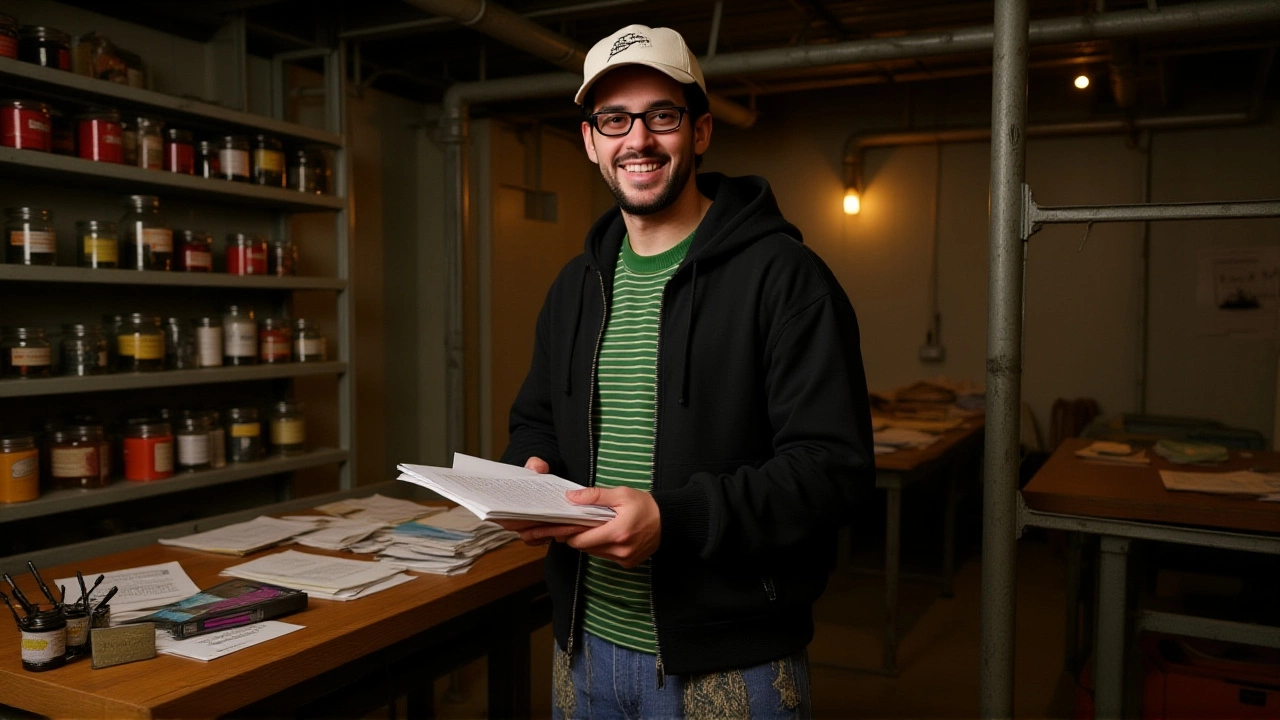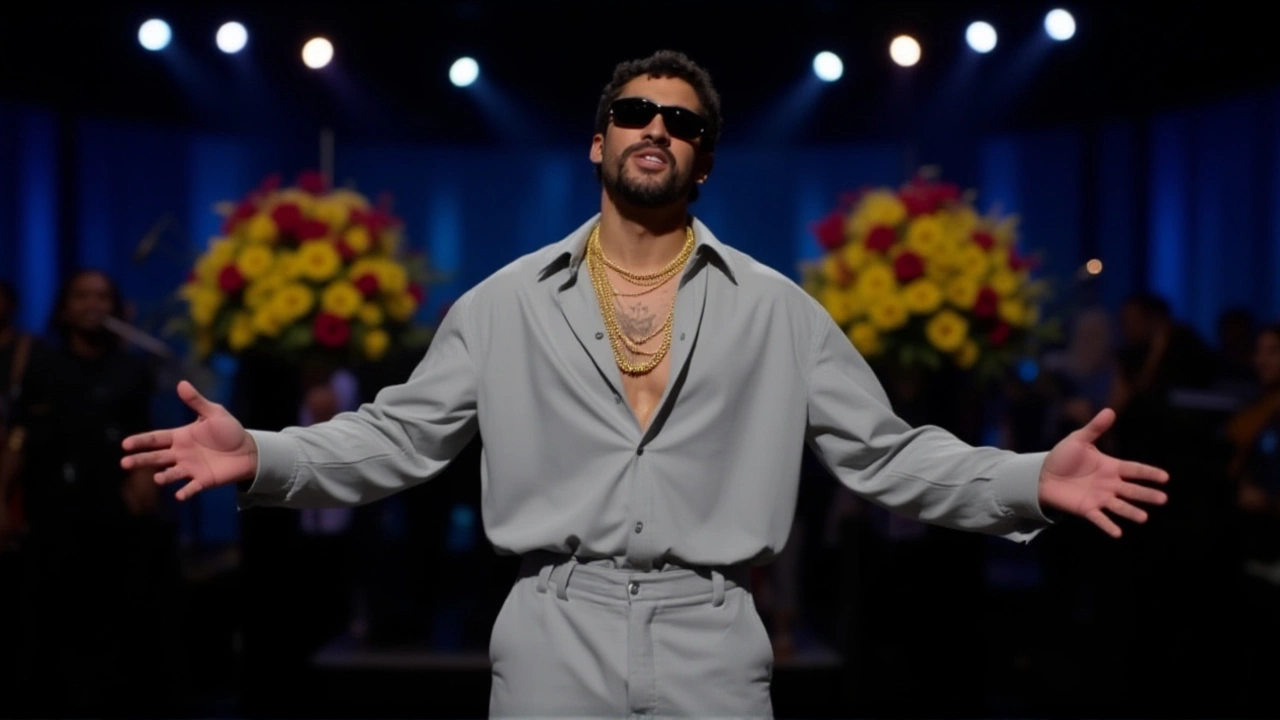When Bad Bunny, the Puerto Rican rapper who’s been topping charts worldwide, stepped onto the stage of Saturday Night Live last night, he wasn’t just there to rock the house – he was there to fire back at the backlash swirling around his involvement with Super Bowl LVIIILas Vegas, Nevada. The platform, produced by NBC, gave him a national audience of millions, and he chose humor over a solemn defense.
Why the Super Bowl sparked a storm
Bad Bunny’s set at the halftime show in Las Vegas turned heads for all the right reasons – a high‑energy performance, surprise guest appearances, and a visual spectacle that reminded everyone why the NFL’s National Football League invests big money in star power. Yet the very thing that amplified his reach also ignited criticism. Some fans and cultural commentators accused him of "selling out" by aligning with a sport they see as overly commercial, while others argued that his presence diluted the traditional halftime vibe.
The backlash wasn’t just a whisper on social media; it materialized in op‑eds, talk‑show panels, and even a few petitions demanding the NFL rethink its choice of performers. Critics pointed to the NFL’s recent controversies over player protests, betting scandals, and labor disputes – suggesting that Bad Bunny’s involvement tacitly endorsed a troubled league.
Bad Bunny’s SNL monologue – comedy as a shield
Instead of a tight‑lipped press conference, the rapper turned the opening monologue on New York-based studio into a comedic roast of his detractors. He started with a dead‑pan line about “the only thing hotter than my verses is the heat coming off the Super Bowl field,” then launched into a series of self‑deprecating jokes that ridiculed the very points his critics raised.
"People said I’d ‘sell out,’" he quipped, "but the only thing I’m selling is tickets to my next album – and maybe a few tickets to the next Super Bowl if they let me practice the dance moves again." The crowd erupted, and the viral clip amassed over 12 million views on YouTube within 24 hours.
His strategy was clear: deflect with levity, keep the narrative on his terms, and remind viewers that as an entertainer, he thrives on crossing cultural lines. By making the critics the punchline, he shifted the spotlight from the controversy to his charisma.
Media and fan reaction: split verdicts
In the hours after the episode aired, reactions splintered along predictable lines. Music blogs highlighted his quick wit, praising the “masterclass in brand control.” The New York Times noted that his jokes “served a dual purpose – entertaining an American audience while subtly acknowledging the political undertones of the NFL’s recent turmoil.”
Conversely, conservative pundits argued the monologue cheapened the seriousness of the NFL’s labor negotiations, calling it “a distraction from real issues.” Social‑media sentiment analysis from Brandwatch showed a 45 % positive lift, a 30 % neutral, and a 25 % negative reaction within the first day.
Even the NFL issued a brief statement, emphasizing that they appreciate “all artists who bring energy to the game” and that “the halftime show remains a celebration of music, sport, and culture.” No direct response from Bad Bunny’s management was recorded, but insiders say the team sees the SNL appearance as a win for the artist’s brand equity.
Impact on Bad Bunny’s career trajectory
From a career standpoint, the SNL stunt may have paid off more than a sober interview would have. Streaming numbers for his latest album, Un Verano Sin Ti, jumped 8 % in the U.S. market the following week, according to Nielsen SoundScan. Ticket sales for his upcoming European tour saw a 12 % increase after the episode, suggesting that the controversy turned curiosity into cash.
Experts at the Music Business Association argue that controversy, when handled with humor, can act as a catalyst for growth. “He turned a potential PR nightmare into a meme‑able moment,” says analyst Carla Mendes. “Fans love a star who can laugh at themselves, especially when the jokes are sharp enough to cut through the noise.”
That said, the long‑term effects remain uncertain. If the NFL continues to face public scrutiny, future collaborations could become riskier. Bad Bunny’s team will likely weigh the benefits of high‑visibility gigs against the possibility of alienating portions of his core fanbase who view the NFL with skepticism.

What’s next for the rapper and the Super Bowl?
Looking ahead, Bad Bunny hinted at a new single dropping next month, which he teased during the SNL finale with a four‑second audio clip. The track, rumored to blend reggaetón rhythms with a “football‑stadium chant” vibe, could serve as a sequel to his halftime performance, keeping the conversation alive.
The NFL, meanwhile, appears undeterred. They have already announced the next halftime headliner – a pop‑rock act that will likely avoid the cultural debate that followed Bad Bunny’s appearance. Whether the league will continue courting Latin‑music icons remains to be seen, but the episode has sparked internal reviews about how cultural partnerships affect brand perception.
For Bad Bunny, the lesson seems simple: own the narrative, laugh at the critics, and keep the beats rolling. As the world watches, he’s proved that a little comedy on a late‑night stage can defuse a controversy bigger than any halftime show.
Key Facts
- Bad Bunny used his Saturday Night Live monologue on Oct 13, 2024 to address Super Bowl criticism.
- The controversy stemmed from his halftime performance at Super Bowl LVIII
- Audience reaction: 12 million+ video views, 8 % U.S. streaming increase for his album.
- Both NBC and the NFL issued neutral statements, avoiding deeper engagement.
- Upcoming: New single expected in November, European tour tickets up 12 %.
Frequently Asked Questions
Why did Bad Bunny choose humor over a formal rebuttal?
Comedy lets him control the narrative without sounding defensive. By making critics the joke, he diffuses tension and showcases his brand’s playful side, which resonates with his younger audience.
What specific criticism did he face after the Super Bowl?
Critics argued that partnering with the NFL signaled endorsement of a league embroiled in labor disputes and betting controversies, accusing him of "selling out" and ignoring broader social issues.
Did the NFL respond to Bad Bunny’s SNL monologue?
The league issued a brief statement thanking artists for energizing the halftime show, but it avoided commenting on the jokes, opting for a neutral stance to keep the focus on the sport.
How did fans react on social media?
Overall sentiment was positive, with a 45 % lift in favorable mentions. Fans praised his quick wit, while a minority felt the jokes downplayed serious NFL issues.
What’s next for Bad Bunny after the SNL appearance?
He’s teasing a new single that blends reggaetón with stadium chants, and his upcoming European tour tickets have surged, suggesting the SNL spot boosted both his music sales and live‑show demand.
